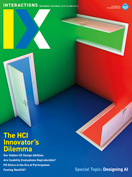Authors:
Paweł Woźniak, Andrzej Romanowski
Poland's first major HCI education event took place in July 2017. The SIGCHI-sponsored Ĺódź Summer School on Methods in HCI invited students from around the globe for an exciting week full of activities. We were lucky to be the organizers of the event.
Our plan was simple. We wanted to bring world-class HCI faculty and international HCI students and involve them with local students and communities to foster interest in HCI. The response we got was overwhelming. We were happy to receive support from the Łódź University of Technology (TUL) as well as local businesses. Most important, we got a very high number of applicants. But we were sad to have to turn down more than half. As we wanted the event to be meaningful for our region in particular, we gave priority to students from Central and Eastern Europe.
On July 7, the event kicked off with 32 students and 14 lecturers. We began with an opening talk and a dinner to break the ice. The remaining days of the summer school were action-packed! Each morning began with a keynote by an expert on a hot HCI topic. The rest of the days were spent in hands-on classes focusing on a particular method. On most days we would visit Manufaktura, a former cotton mill turned entertainment center and Ĺódź's prime tourist attraction, to engage local users. This "one method a day" program was quite intensive, but it enabled students to get an overview of a variety of methods and pick the ones to study further. We invited local undergraduate students to help with the logistics of the summer school. To our delight, they were happy to listen in during the lectures. We hope we also stirred their interest in HCI.
 |
Summer school students exploring artifact ecologies. |
The program had several highlights. On the first lecture day, all participants took a leap of faith and rode a zipline across Manufaktura's square. This helped lighten the mood in the group. We also hosted a public event where students tested the prototypes they developed during the summer school. They invited local residents to participate and rewarded them with food and drink. Despite a downpour that made the testing extra difficult, many participants enjoyed using the new devices and learning about HCI. It also provided an exercise in popular science for both students and faculty. The school ended with a momentous dinner featuring abundant quantities of local food.
We were very glad to see local and international students extend their networks with peers and professors. We have already received reports of research work conducted based on ideas developed during the summer school. Most important, we managed to put HCI on the map in Poland and show its relevance to academics and the public. What's more, the activities included in the summer school contributed to other initiatives: Shortly after, an HCI student club was established. The school also led to an extended international network, which now supports the process of establishing Poland's first HCI master's program.
We are grateful to SIGCHI, the organizing universities, our lecturers, and the students for their commitment and support. We believe that the summer school is only the first step toward establishing a strong research and education agenda in Poland and Eastern Europe. The school will have its second edition in the summer of 2019.
Paweł W. Woźniak is an assistant professor at Utrecht University. While he loves HCI in all its breadth, his focus is on understanding and designing better technologies that support well-being and augment the experience of physical activity. He also conducts research in multi-surface interactions and augmenting sensory perception. [email protected]
Andrzej Romanowski is vice dean and assistant professor at the Institute of Applied Computer Science, Łódź University of Technology (TUL). He is a pioneer in problem-based learning and design thinking at TUL. As a practice-oriented academic with industry experience, he is primarily interested in stimulating user development through interactive systems. [email protected]
Copyright held by authors
The Digital Library is published by the Association for Computing Machinery. Copyright © 2018 ACM, Inc.








Post Comment
No Comments Found